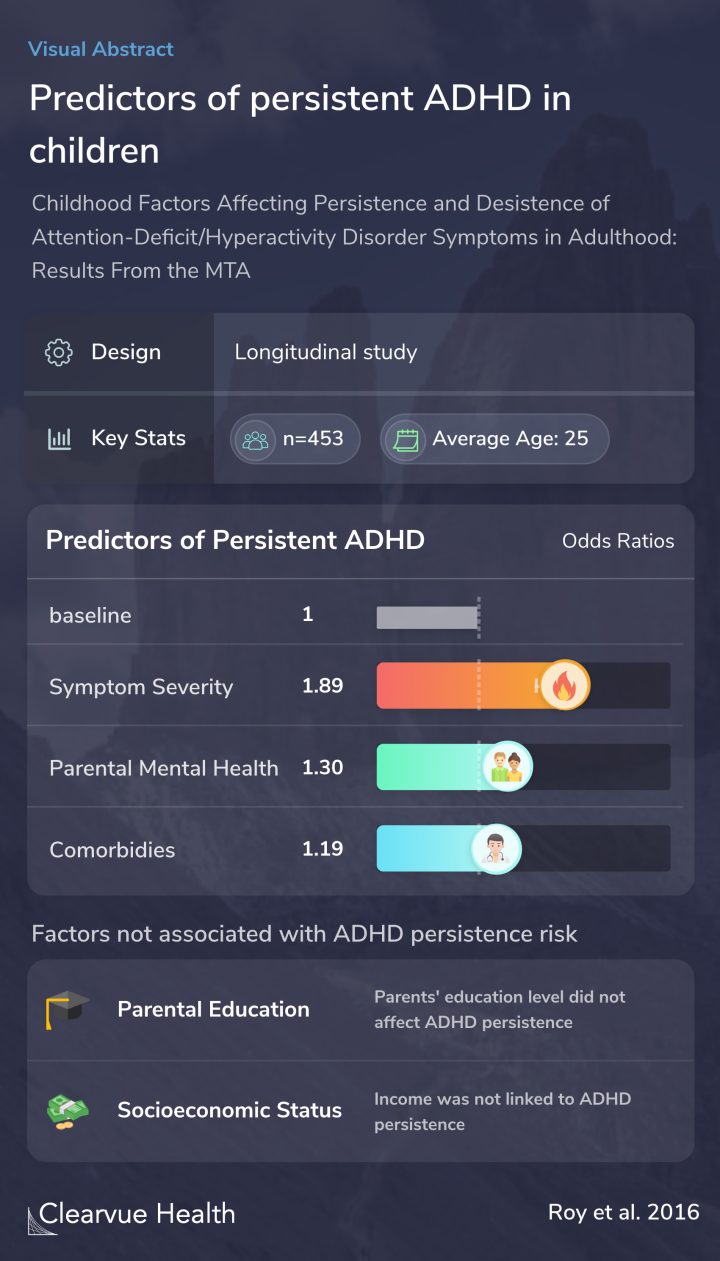Childhood Factors Affecting Persistence and Desistence of Attention-Deficit/Hyperactivity Disorder Symptoms in Adulthood: Results From the MTA
Predictors of persistent ADHD in children
Dr. Arunima Roy, MBBS, Dr. Lily Hechtman, MD, Dr. L. Eugene Arnold, MD, Dr. Margaret H. Sibley, PhD, Dr. Brooke S.G. Molina, PhD, Dr. James M. Swanson, PhD, and Dr. Andrea L. Howard, PhD, for the MTA Cooperative Group

Objective
Research has shown that most kids with ADHD show improvement by the time they are adults. However, some continue to have ADHD after age 18. It is not entirely clear why some individuals get better, and others do not. The authors of this study wanted to see whether they were factors that could be linked to persistent ADHD.
To determine childhood factors that predict attention-deficit/hyperactivity disorder (ADHD) persistence and desistence in adulthood.
Method
Researchers used data collected from a larger longitudinal study of ADHD covering 453 participants.
They statistically analyzed ADHD risk and other data points, such as parental characteristics, to see whether certain factors were significantly linked to ADHD persistence.
Regression analyses were used to determine associations between childhood factors and adult ADHD symptom persistence in 453 participants (mean age = 25 years) from the Multimodal Treatment of ADHD study (MTA). Childhood IQ, total number of comorbidities, child-perceived parenting practic...
Results
They found out that the best predictor of whether a child would continue to have ADHD as an adult was the severity of their ADHD symptoms. Those with the most severe ADHD symptoms were also the most likely to have ADHD as adults.
Two other factors significantly linked were comorbidities and parental mental health problems.
Those who had other mental health conditions at the same time, which experts call comorbidity, were more likely to have persistent ADHD. Children with parents who have mental health conditions were also more likely to have persistent ADHD.
The most important childhood predictors of adult ADHD symptom persistence were initial ADHD symptom severity (OR = 1.89, SE = .28, p = .025), comorbidities (OR = 1.19, SE = .07, p = .018), and parental mental health problems (OR = 1.30, SE = .09, p = .003). Childhood IQ, socioeconomic st...
Other factors, such as parental education and socioeconomic status, were not linked with ADHD persistence risk.
It doesn’t matter where your parents went to school or how rich they may be. Children of all socioeconomic statuses have similar chances of getting better.
Conclusion
Researchers concluded that ADHD symptom severity, parental mental health, and the presence of other mental health conditions in a child are strong predictors of whether a child will continue to have ADHD as an adult.
This study helps us better understand the risk factors behind ADHD. It also suggests that by addressing the factors above, it may be possible to improve the odds of a child getting better by the time they reach adulthood.
Initial ADHD symptom severity, parental mental health and childhood comorbidity affect persistence of ADHD symptoms into adulthood. Addressing these areas early on may assist in reducing adult ADHD persistence and functioning problems.